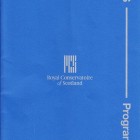Agrippina 2017Royal Conservatoire of Scotland
Read more about the opera Agrippina
Each year the Conservatoire's opera performances seem to reach higher standards, and Agrippina continued the trend.
In recent seasons, the Conservatoire has nursed its opera students in vocal technique by means of Monteverdi and Mozart. Those are excellent models for the disciplining of young voices. It is, though, a decade since they last tackled a Handel opera, Rinaldo, and that is too long a gap. Agrippina is a good choice - being an early work, the last from his Italian period, it is rather different in style from the wonderfully virtuosic vocal writing he went in for later. The arias tend to be rather shorter, even though in the familiar da capo form - and the repeated stanzas are less elaborate. Even so, the complete text of the opera is quite long, largely due to the plot being transmitted by means of extended sequences of recitative.
On this occasion the work was subjected to some cuts, without damaging it unduly. It was sung in generally excellent Italian, but even with the benefit of fluently written supertitles a complete text might have proved as difficult for the audience to concentrate on as for the students to learn and transmit. Prof Tim Dean, Head of Opera, had worked extensively on Agrippina during his years with Kent Opera at the start of his career, so perhaps had an idea where the pruning shears might be applied. As it was, the three acts were remodelled to just two, with the interval well placed after Ottone's excellent lament following his rejection by everyone, 'Voi che udite il mio lamento' with its beautifully plaintive oboe accompaniment. With a start at 07:15, there was little pressure on late transport (often an issue with Handel), with curtain down around three hours later.
Musically there was a great deal to enjoy. David Watkin was a new face as conductor, and he drew some beautiful playing from his pit band. The secco recitatives were accompanied by harpsichord and cello at stage level to the left. Those arias that required some delicate instrumentation had a second keyboard along with lute and theorbo to the right. Some arias were underpinned by the band, who generally joined in for the sections between verses (almost Monteverdian ritornelli). Trumpets and drums, required briefly in the first half, were above, on the balcony to the left. The overall effect was lovely, with a great sense of communication developing.
Most of the singing was highly accomplished. Three of the leading parts - Agrippina, Nero and Poppea - were double cast. At the opening night, Emma Mockett, in the title role, showed a dramatic voice with an accomplished delivery of the recits. She was also able to fine down her tone for her beautiful last act aria 'Ogni vento'. Nerone must be a difficult role to balance dramatically. A 'trousers' part, the character is at the difficult adolescent stage, in most respects essentially a Cherubino figure. However there should also be something else visible, a slight whiff of danger if not actual insanity. Svetlina Stoyanova's reading was superbly accomplished - in a thoroughly convincing combination of vocal and dramatic skills. Her final aria 'Come nube che fugge dal vento', with a very different oboe obbligato (by the excellent Rachel Curry), which Handel used again in Rodelinda, was brilliantly successful. Charlie Drummond was also effective as Poppea, projecting the humour of the part as well as the determination as she realises she has been duped by Agrippina.
At the final performance, the second one involving the alternate cast, Maria Hughes was a fierily dramatic Agrippina, spitting out her recits with appropriate fury, and treating her scena 'Pensieri, voi mi tormentate!' almost like an embryonic mad scene - very impressive. Jessica Eccleston brought out the wit in Nero's role, without quite getting the unhinged quality, and Joanna Norman revealed the vicious aspects of Poppea's character quite clearly. They were every bit as committed to their roles - certainly not a B team in any sense.
Another outstanding interpretation was that of Joanna Harries as Ottone. A newcomer to the Conservatoire, she has a beautifully schooled mezzo and projected each of her emotionally penetrating arias with great accomplishment. In the farcical antics of the bedroom scene she also displayed a useful flair for comic timing. At the last performance (having also sung this demanding role the night before) she did sometimes sound slightly tired. Of the others, Stefan Berkieta made an effective Emperor - a high-lying part nevertheless containing some cavernous low notes, which worked rather better at the end of the run. Another new name, Christopher Dollins, also made a positive impression as Lesbo. Lynn Bellamy and Jerome Knox gave neatly sung and well contrasted performances, though their characters were more difficult to define. They are serious figures, desperately changing sides repeatedly, determined to survive as the fortunes of their betters rise and fall - but they were treated almost entirely as joke characters.
The production by John Ramster was in modern dress - unrealistic to expect anything else, nowadays - with any difficulties of logic glossed over - but the fundamental ideas of political and family manoeuvring are always with us. The set designs of Adrian Linford were elegantly simple and well lit. The costumes were less effective - while Claudius was dressed for grand ceremonial, Otto looked more like a naval cadet or hotel bellboy. A team of five silent extras did wonders in providing extraneous characters, as well as scene-shifters.
While the opera is a comedy, if a distinctly dark one, that perhaps only becomes really clear in the last act, when Otto, Nero and Claudius are hidden simultaneously in Poppea's bedroom. Here the ribaldly comic tone was indicated right from the start of the opera, which reduced the seriousness of stature of Agrippina and Nero, as well as the two conspirators, Narciso and Pallante, who were camped up to the point where the seriousness of their roles evaporated.
The musically lovely reconciliation sequence when Otto reveals his feelings to Poppea in a garden - she pretends to be talking in her sleep and revealing vital elements of plot by that means - was relocated to a café complete with comic waiter, beggar and courting couple. Perhaps too much distraction? Amends were made with their second duet at the end of the bedroom scene - full advantage was taken of the sound perspective with the different instrumental groupings, and no visual distractions whatever.
All in all, this was an enormously enjoyable evening, letting us see a sharp and successful presentation of a great Handel opera that is still unjustly neglected, even if it was one of the first to be revived in modern times. The Conservatoire really has developed an excellent track record with its productions of baroque repertoire.
Performance Cast
- Agrippina wife of Claudius
-
Emma Mockett (Jan 21, 27)
Maria Hughes (Jan 23, 28)
- Nerone son of Agrippina
-
Svetlina Stoyanova (Jan 21, 27)
Jessica Eccleston (Jan 23, 28)
- Poppea a Roman lady
-
Charlie Drummond (Jan 21, 27)
Joanna Norman (Jan 23, 28)
- Ottone commander of the imperial army
- Claudio Emperor of Rome
- Narciso a freedman
- Pallante a freedman
- Lesbo a servant of Claudius







